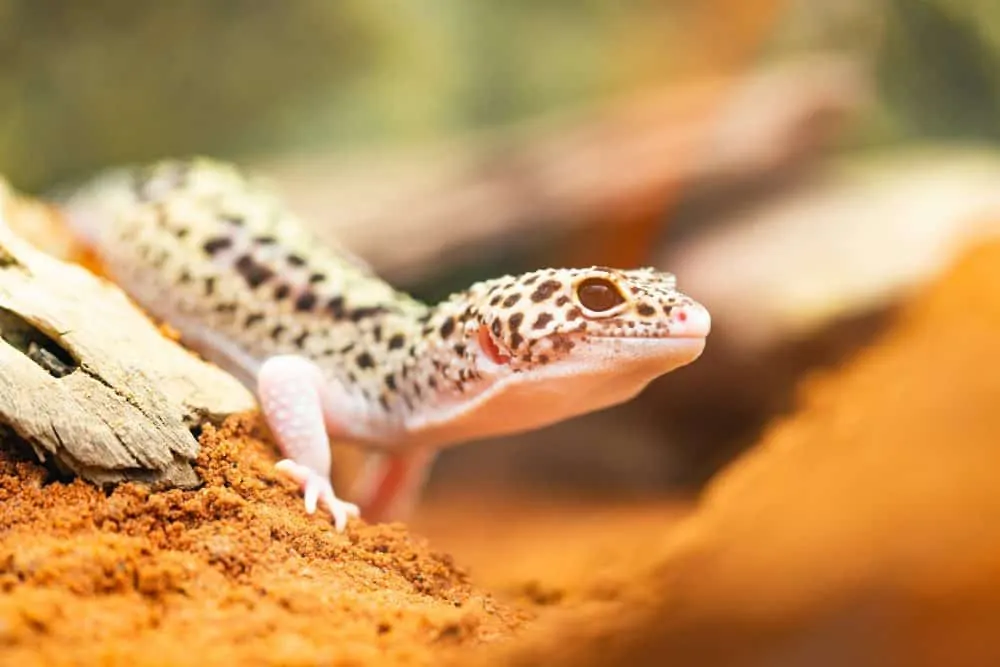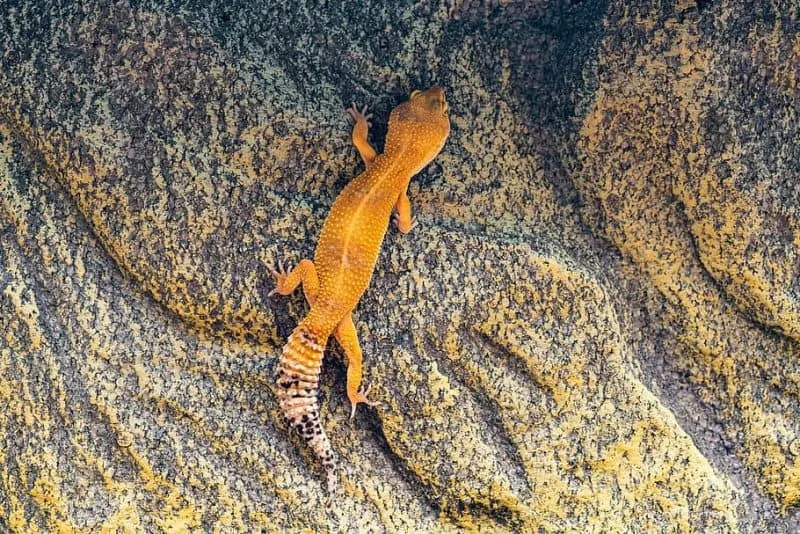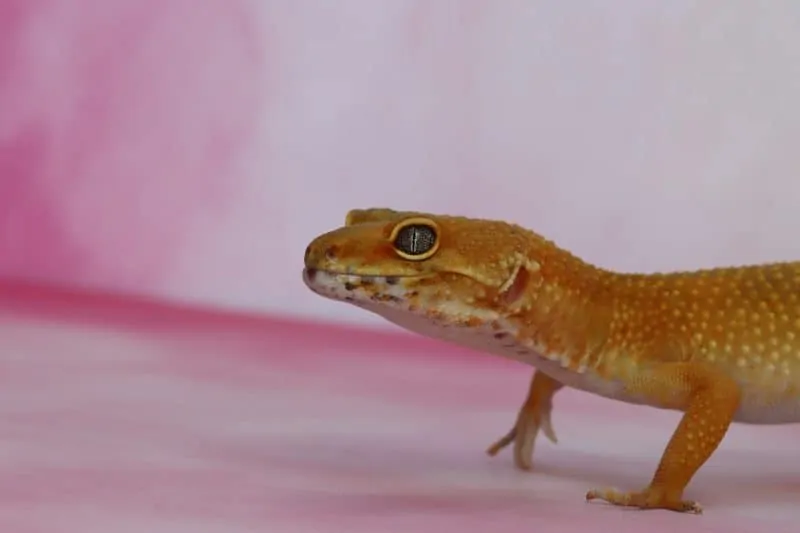A leopard gecko that won’t eat for days is of the owner’s worst nightmares. This agonizing experience causes great stress and worry in both novice and experienced leo owners.
To make things more tricky, the reason for appetite suppression can vary greatly.
However, if your leopard gecko is refusing to eat, don’t get desperate. By noting other symptoms (if there are any) you will be able to find a reason behind the event and find an efficient solution.
In this article, you’ll find all the common reasons why a leo would quit feeding, and what you can to bring his appetite back.
Reasons Why Your Leopard Gecko Is Not Eating
Here are the most common reasons behind leopard gecko hunger strikes.
Rehoming
One of the most common stories of leo’s lost appetite has one central event – leo just got into a new home. A seemingly healthy animal won’t even look at the insects it used to chomp down on happily at his previous location. Days of refusing to eat turn into weeks, and it is perfectly normal for a new leo owner to become heavily worried at this point.
Fortunately, due to their metabolism and fatty deposits, leos can live normally for a surprisingly long time without any food. The next section will teach you more about how long can a leo last without food.
In these situations, the most common scenario is that, after weeks have passed, a healthy leo will start eating. If you have a possibility, have him checked out by a vet if the food refusal lasts for more than a month. The vet will check your pet for parasites, which is important.
Also, you can use a home-made liquid supplement called “slurry” to get some nutrition into your leo, but more on that later.
Breeding season
Leo’s breeding season lasts all the way from February to November. At some point, the geckos – especially males – can get so preoccupied with their reproductive instincts that they will stop eating.
I recommend that you try to additionally stimulate feeding if the reluctance to eat goes beyond a couple of weeks. Check out Section five for info on how to do that. However, leos may still quit their food from time to time during the season.
Ovulation in Females
Ovulation is a process of egg formation in female leopard geckos and occurs from January through June or July. They can ovulate even without a male present. Some females will stop feeding during this period.
Many sources say that it’s completely acceptable for leos to fast throughout the entire season. However, I would still offer them food regularly and try to stimulate feeding.
You can’t stop ovulation from happening, but you can keep your leos are in top condition at all times to ensure their bodies won’t suffer during a breeding season fast.
Cold Tank
A tank that is too cool can result in refusal to eat, as well as a general lack of activity. Also, it can cause a lizard to regurgitate partially digested – or undigested – food items.
This is the first and the easiest thing to check when your leopard gecko acts lethargic and weird is the temperature. The proper daytime temperature in your leo’s tank should be 75° to 85°F (~ 24-29 °C), with the basking area going up to 90°F (~ 32 °C).
A good temperature gun will enable you to quickly check the temperature on both sides of the tank.
Brumation
Even a captive leo will most certainly feel the changing of the seasons. Some leos will “insist” on entering winter rest – called brumation – even if you don’t change the tank temperature. If a completely healthy leo stops eating in late autumn or early winter and spends much time hiding, there is a high possibility that he’s trying to brumate.
The best course of action is to go along with it. Lower your leo’s temps according to recommendations and make sure to gradually shorten the lighting period.
Cohabitation stress
If you keep two or several leos together, the weaker one(s) can get bullied. The stress can cause them to stop eating.
That is the reason why responsible reptile experts are always against cohabitation. The only way to resolve the issue is to house your leopard geckos separately
Picky Eaters
Some leos are simply picky eaters. One may dislike mealworms. Another one won’t touch crickets. The bad news is that if a leo is not keen on a certain type of food, there is a slim chance you will be able to change his mind.
Offering a varied diet is a good way to ensure that your picky leo will always find something that suits him.
Diseases and Health Conditions
Unfortunately, a number of illnesses and health issues can cause a lack of appetite. These include:
- Parasitic infections
- Mouth sores and abscesses
- Mouth rot
- Impaction (especially if you have loose substrate)
- Metabolic Bone Disease (MBD)
- Organ (liver, kidney) failure
How Long Can Leopard Geckos Go Without Food?
Thanks to fatty deposits that make their tails so plump, leos can go without a meal for a long time. For how long?
Well, no one knows exactly. It would be extremely cruel to create experiments to determine that, but anecdotal evidence obtained thanks to gecko escapees and poorly kept animals tell us that they can last for a month or even more without food. Breeding season fast can last even longer. However, after a month, you are entering the uncharted and possibly unsafe territory.
Fasting is different for juvenile leos and adult leos. Because of their high energy and nutrient demands, young leos can get more damaged by a prolonged period of not eating.
> Further reading: Dying signs in leopard geckos
Why Is Your Baby Leopard Gecko Not Eating?
There are several common reasons why a baby leo won’t eat.
- Food items that are too large. Always feed your leos insects whose size is not larger than the space between your pet’s eyes.
- Cool temperatures. To have an appetite, young leos need an ambient temperature within the optimal range.
- Impaction. If you keep your leo on a loose substrate, especially sand, it could cause a bowel impaction. Consult your vet immediately if you suspect this condition.
- Lack of nutrients and metabolism issues. Make sure you gutload your feeder insects, dust vitamin and mineral powder regularly, and provide supplemental calcium/D3 powder in your baby leo’s tank.
How To Get a Leopard Gecko to Eat?
Here are a few strategies to help your leo eat again.
Offering favorite food
Offer your leo whatever he likes to eat most to pull him out of the anorexic state. Most lizards are crazy about waxworms, which are an insect equivalent of bacon. Others love hornworms. After he stabilizes, you can continue to feed a variety of food as usual.
Offering “wounded” food items
Some leos will react with an appetite to their prey’s bodily fluids. Offer him a mealworm or a superworm cut in half with feeding tweezers. Refrigerate the insects before cutting, as cooling has an anesthetic effect.
Offering a special formula with a syringe
Make a “gecko slurry”, which will provide a quick dose of the essential nutrients and vitamins to a starving leo. Your lizard will lick it off instinctively from the syringe or from the tip of his nose. If there are no underlying conditions, some leos will regain their appetite by licking the slurry. If you are not comfortable with making your own for any reason, there is a product called Emeraid Intensive Care Carnivore that is suitable for leos. It provides important nutrients such as amino acids, proteins and fats to sick exotic carnivores, but can be used in cases of anorexia as well.
Force-feeding
Some will recommend force-feeding as a last resort. Personally, I would never do this on my own without consulting a vet first, as it can lead to grave injuries if not done right.
Warm bath
In cases of digestive distress (e.g., mild impaction), a swim in lukewarm water will help your leo pass the stool and get his metabolism going in general.
Bon appétit, our gecko buddies!
Is your mind a bit more at ease in relation to the leo hunger strike now? I surely hope so.
Fasting can be a normal thing for leos and should be approached calmly, but – it should never be taken lightly. Although chances are small, some serious housing and health issues could be the real reasons behind your leo’s lack of appetite.
The best course of action is to explore all the possibilities and then consult a reptile vet if any uncertainties linger.
Did you ever have any issues with your leo’s appetite? How did you solve it? Let us know in the comments.





11 Comments
If my gecko is really pregnant, I don’t need to be worry about the fact that she doesn’t eat…
Hi, my leo hasn’t eaten for almost three weeks and I’m pretty worried. I’ve tried feeding him different foods almost every day, but he’s just not interested. I’m going to try your methods, and hopefully, he’ll be okay. Thanks for the article 🙂
Hi Stella,
I’m sorry you got worried. Three weeks isn’t an awful lot of time in the leopard gecko world to abstain from food. However, it may indicate there’s something going on. Look out for signs of disease, injury, or stress, and keep an eye on the temperatures. Let us know how it all worked out!
Thanks for you help.
Thanks for you site
Just had our geko for a week now she to has stopped eating there was crickets still in her vivarium the next day is it best to stop and reintroduce crickets in couple of days
Hi Gary,
If your leopard gecko has stopped eating, it is best to reintroduce crickets or mealworms after a couple of days. Try offering 5-7 small crickets or mealworms every day until they reach about 4 inches. Larger food should be offered every other day until they become full grown in about 10-12 months.
Thanks!
Thank you, my leo is not eating and I assume she is ovulating, because it is that season.
Thank you so much for this informative site! My daughter is new to keeping leopard geckos and after moving the gecko to a new room, it seems not to be interested in eating crickets. It still is eating mealworms, but my daughter was getting very worried. Thanks again for the information it was very helpful!
try locusts. my leo loves them. we originally fed him crickets but he went off them pretty quickly. although locusts are jumpy, they provide good nutrition to geckos. mine doesn’t like mealworms but loves waxworms. These may temp them to eat in it’s new enviornment.
Hi Ciss,
My leos also loved locusts and enjoyed them as long as I had a reliable source. They’re also nutritious. I always offered them to my geckos with tweezers and never let them run (or jump) around the tank, just in case.
Due to their fat content, waxworms should be given as a treat, and never as a staple – but you probably already know this. Also, you can “spoil” your lizards by offering waxworms often; they could start avoiding other feeders because they’ll always expect something this tasty. It’s the bacon of the feeder insect world!
Thank you for commenting.